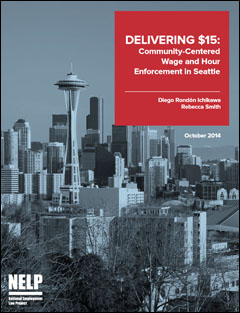LOCAL
Seattle needs community groups for $15 enforcement, report says
SEATTLE (Oct. 27, 2014) — Seattle made history by becoming first city in the nation to adopt a $15 minimum wage, but it will need to strengthen its labor standards enforcement to ensure that workers get the raise due to them — and community groups should play a key role in that effort, according to a new report from the National Employment Law Project.
“We don’t have a $15 minimum wage if we don’t enforce a $15 minimum wage,” said Rebecca Smith, deputy director of the National Employment Law Project and the report’s co-author. “Educating the employer community is one key to compliance, but education isn’t enough. A robust wage enforcement system needs strong partnerships with local community organizations — groups that are trusted by workers who might not be willing to file complaints directly with the city.”
 The report, Delivering $15: Community-Centered Wage and Hour Enforcement in Seattle, finds that existing wage-and-hour enforcement resources are woefully inadequate: The U.S. Labor Department has one wage-and-hour investigator for every 172,000 employees in the greater Seattle area. The average employer has a less than 0.001 percent chance annually of being investigated by the U.S. Department of Labor’s Wage and Hour Division. At the state level, the Department of Labor and Industries employs only two investigators in the city.
The report, Delivering $15: Community-Centered Wage and Hour Enforcement in Seattle, finds that existing wage-and-hour enforcement resources are woefully inadequate: The U.S. Labor Department has one wage-and-hour investigator for every 172,000 employees in the greater Seattle area. The average employer has a less than 0.001 percent chance annually of being investigated by the U.S. Department of Labor’s Wage and Hour Division. At the state level, the Department of Labor and Industries employs only two investigators in the city.
“It’s clear that government can’t go it alone,” said Hilary Stern, executive director of Casa Latina. “Community groups are best suited to reach immigrant and low-wage workers who are most vulnerable to wage theft. They have their trust, speak their languages, and know the industries where their members work. They can play a critical role in education and outreach, as well as provide moral support to workers who have had their wages stolen. But they can’t play that role if they aren’t adequately funded.”
The report applauds Mayor Ed Murray’s creation of a Division of Labor Standards Enforcement in the city and recommends key elements of a strategic enforcement plan. It criticizes enforcement systems that rely solely on complaints by workers, citing a study of the largely complaint-based federal system that found that for every one complaint received for violation of overtime laws, there were over a hundred other labor standards violations that went undetected. According to worker surveys, many workers don’t file complaints in part because nearly half of those who suffer wage theft also face retaliation for speaking up about it.
Daivon Young is one such worker. Young, who is the sole breadwinner in his family, was shorted pay during his work as a security guard for a company called Security Industry Specialists. “I have talked to co-workers who had the same problem that I did, but they are terrified of losing their jobs. They won’t come forward,” said Young.
“Business needs a level playing field, and workers need the raise they are promised under the new law. That means we all need strategic enforcement that focuses precious governmental resources on the most vulnerable workers in the sectors most likely to violate the law,” said Smith. Restaurants, service industries, retail and construction are among the highest-violation sectors, according to enforcement data cited in the report.
A landmark 2009 study by the National Employment Law Project showed that wage theft is rampant in major American cities. More than two in three of the nearly 4,500 workers surveyed in that study experienced at least one pay-related violation in their previous work week.
The new report commends Mayor Murray’s decision to set aside money in the budget for community-based outreach to low-wage workers, but recommends significantly higher funding levels. It cites several innovative community-focused enforcement models, including one first pioneered in San Francisco. San Francisco currently devotes nearly a half million dollars to contracts with community groups who educate their members about their rights and attempt to informally settle claims, before handing them off to the city for further action.
For more information, visit www.NELP.org.





